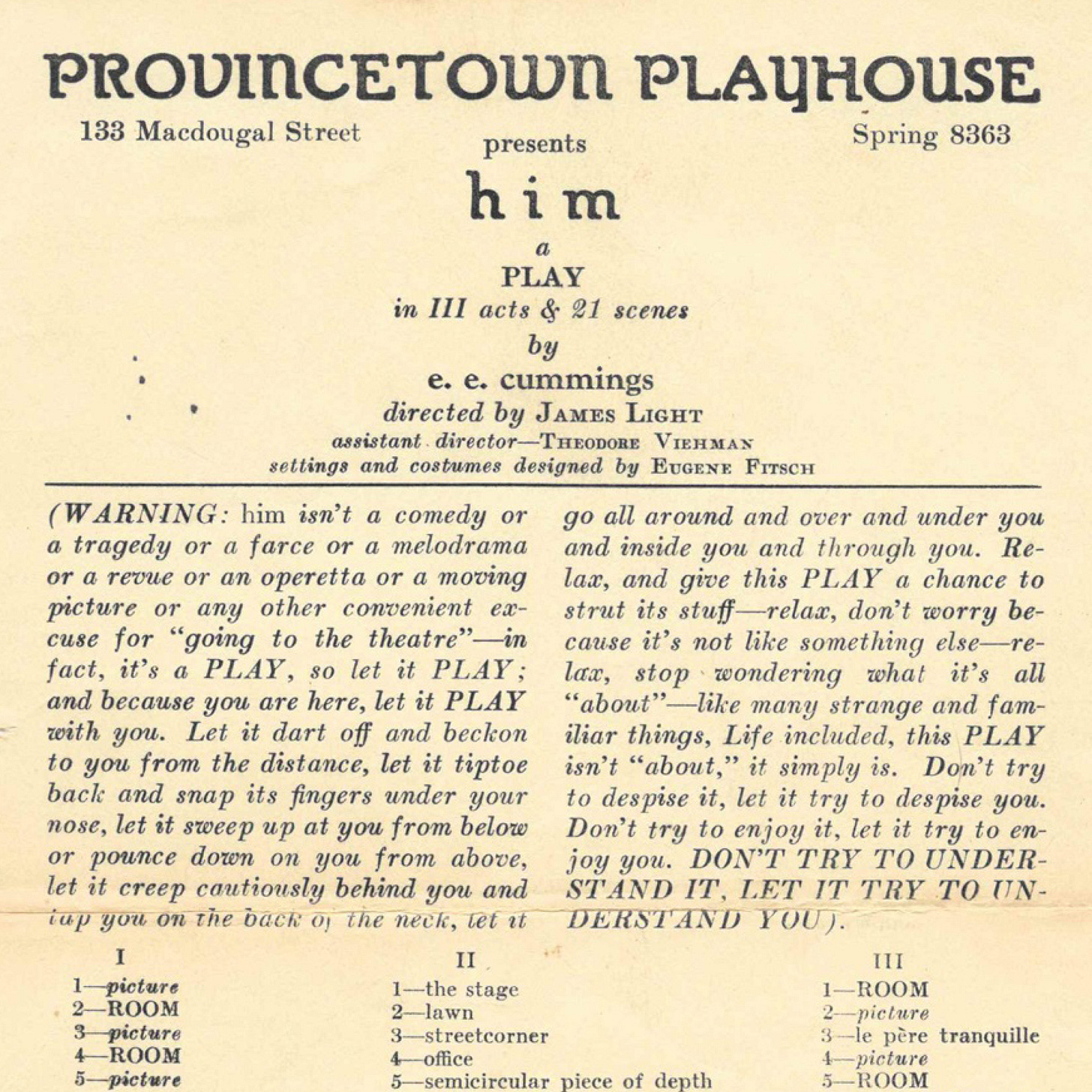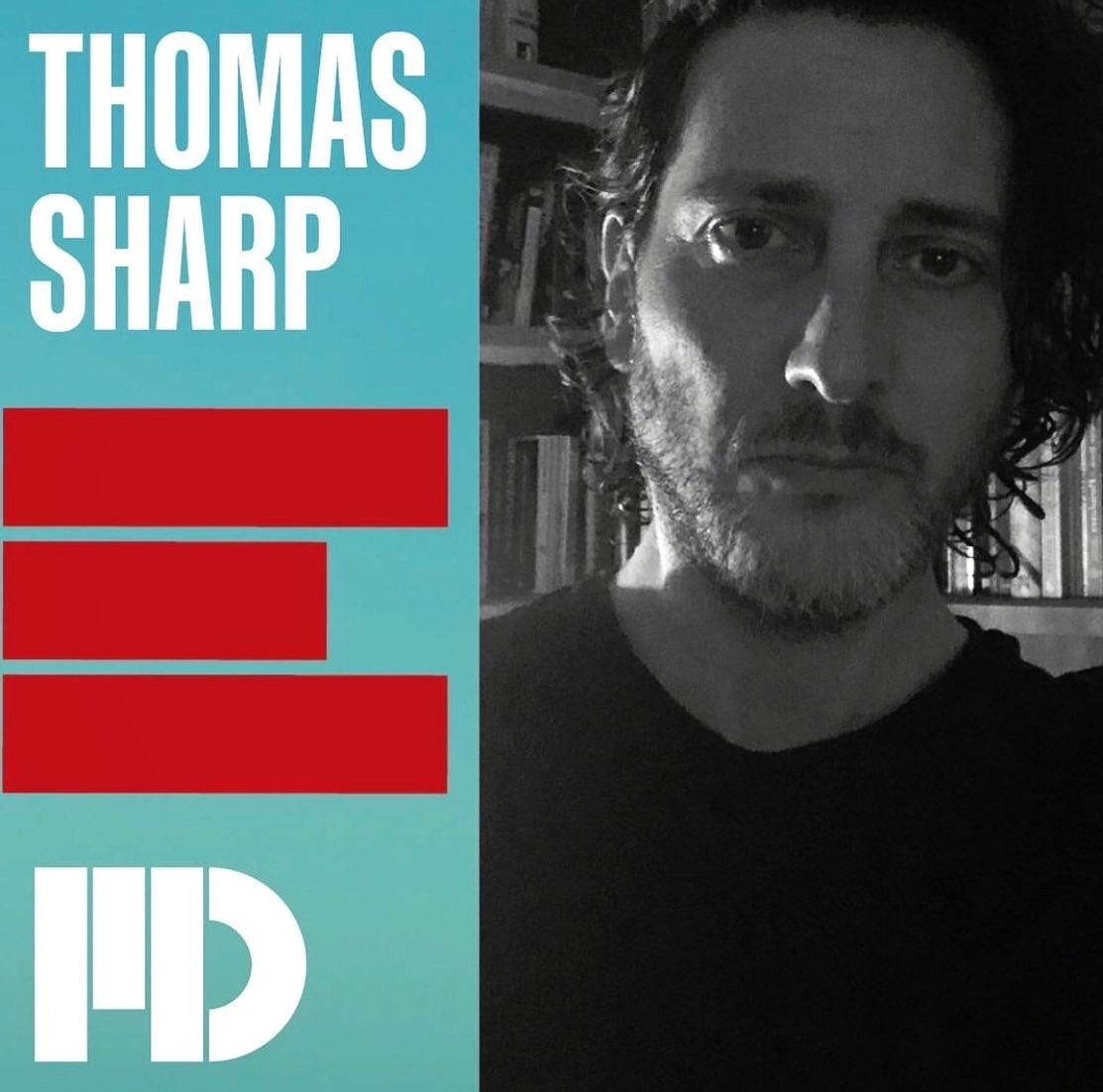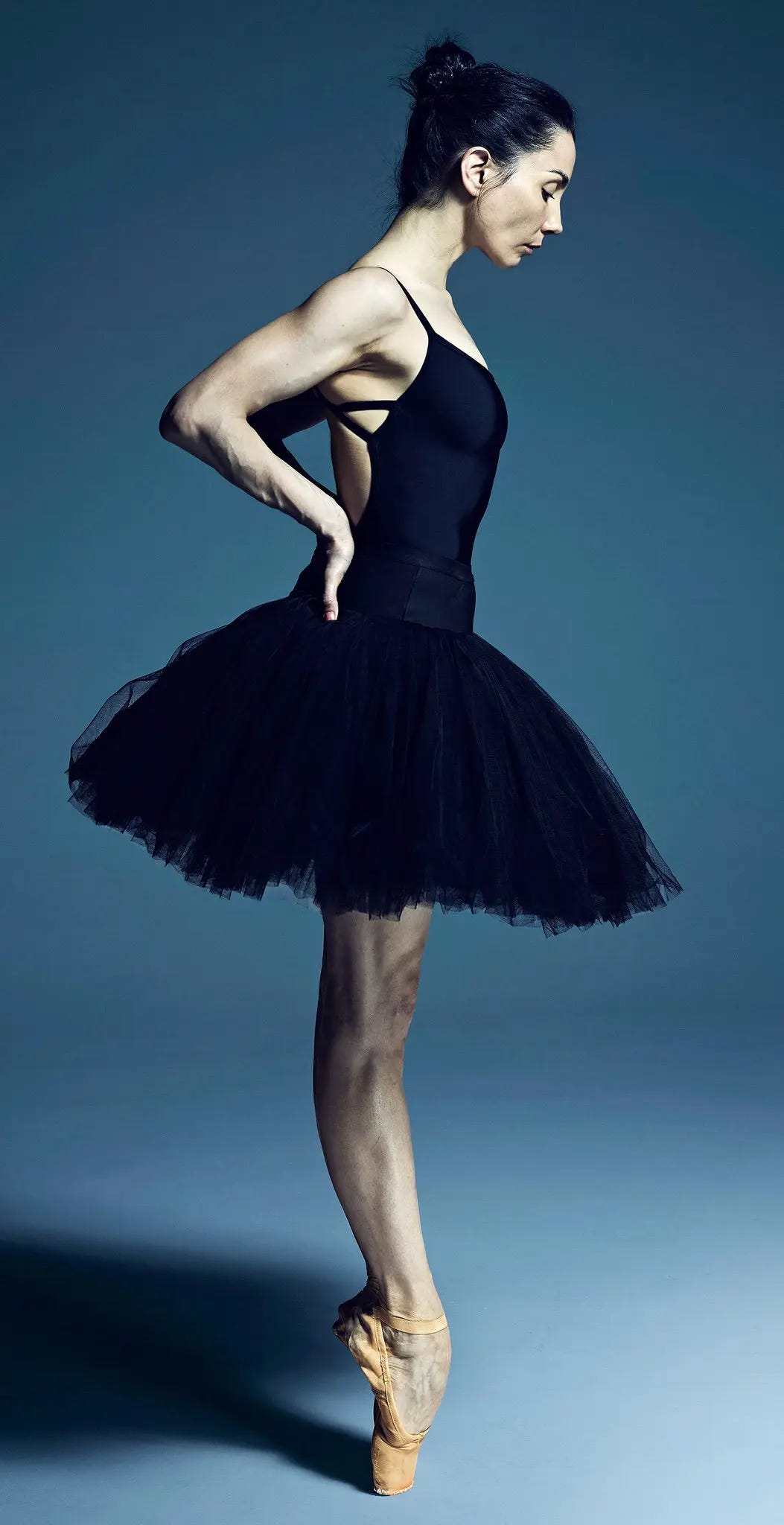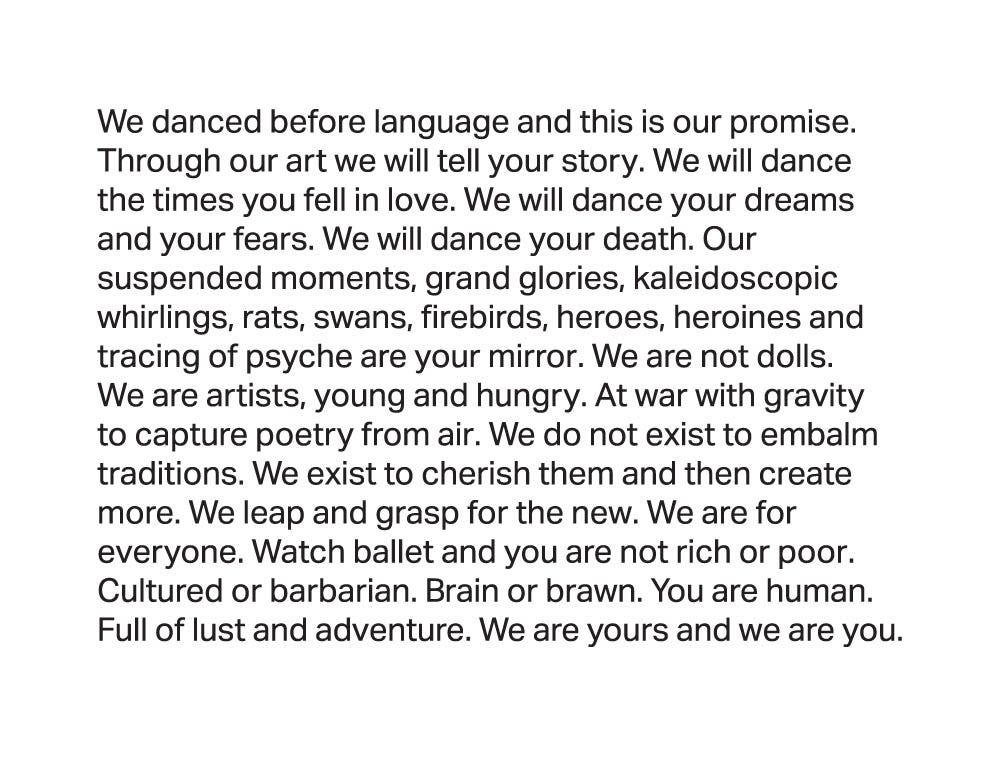known for his punctuation punctured : poems , e e cummings (also) wrote four plays.
him premiered in new york in the spring of 1928. it is surrealist , and influenced by freud’s ideas , as well as vaudeville , circus, and burlesque ,, and is a precursor to absurdist theatre .
(ive been thinking a lot about absurdist theatre recently – one of my current projects is about aleister crowley’s sex magick adventures in the algerian desert and is in the form of an absurdist play .. if you’d like to read the very early workinprogress then just email me and i'll share)
theres no point me describing the plot of him to you , its surreal in the extreme , but here’s cummings’ introduction to the work on the plays 1st programme .
isnt that wonderful ? ‘relax, stop wondering what it’s all “about”’
to be a writer is to think eversomuch about how your writing will be read or experienced .
that might seem like a simplistic or obvious statement , but im not sure its interrogated enough . and in fact we write in a literary milieu that makes a lot of assumptions …
… that the best writing is that which is embraced by lots of people /
that the only path to being a ‘successful’ writer is to tentatively or bombastically )depending on the character you’re playing in this life( approach publishers and hope for approval /
that awards and a place in bookshops are true measure of achievement /
that sharing worksinprogress with others is somehow unprofessional
i have thoughts,and you can read them after this intermission //
I’m appearing at the brand new Margate Festival of Design on 17th September. It’s a festival created by The Margate School. Tickets have just been released, my show is free but there are only 50 seats, so book now if you’re coming. Here’s a primer.
What kind of magic is language and design? Can you creatively seed an idea that will change a system? This is an hour about trying to introduce a new meme into culture – that City traders are the faery folk the old tales warned us against. You’ll hear a capitalist folk-horror faustian faery tale poem and discover the truth about how and why thirty of us planted the world’s largest faery ring around the City of London’s Square Mile on Leap Day 2020.
The poem is The Weeping Cufflinks and the Margate reading will be the very first time it will have been performed in full, in public. I’ll also be selling copies of the work with all proceeds going to a local food bank, as is my fee for the performance.
im back. in the act of writing we’re all searching for something aren’t we? A something which is often boiled down to one of two things …
The first is nicely put by one of my touchstones, Cecil Day-Lewis.
‘We do not write in order to be understood; we write in order to understand.’
Self-discovery in other words. If that was true then no writer would be bothered to try and get published. The shadow work would be enough. It generally isn’t, of course.
The second thing writers say they want is readers. Such a vague statement.
I’ve mentioned this before, so forgive me for being a bore, but a while ago I realised that I was thinking about writing ‘success’ in an incredibly vague way. I’d figured out that my work was never going to have the appeal, or I the cultural capital, required to dance on the publishing and bookshop stage, and so I happily began self-publishing.
But I hadn’t really thought about *what* I wanted out of self-publishing. We know, as writers, we’re looking for something … but it tends to be this misty mass of ‘achievement’ diaphanously made up of some famous-writer-interviews we’ve read, social media humble bragging by people we consider our peers and a wayward conviction that anyone who is actually good will eventually get ‘discovered’.
So I quantified what I wanted. Vowed to myself that if I have 30 to 50 engaged readers by the end of my life, then that will be a fine result. It’s remarkable how simple such a figure makes everything.
I think I perhaps have about ten engaged readers right now, that’s from three and a bit years of putting work out there. Assuming it’s kind of exponential, I reckon I can add five readers a year. So if I write and release new work at a similar rate as I have been doing, then I can reach 30 readers in another four years.
(This is very much my thinking around my Get One, Give One offer on my new book.)
Fully aware all this sounds naive and small time and non-poetic and unprofessional and all the other things a writer is not supposed to be. Relax, stop wondering what it’s all “about”.
I’ve been thinking about this because occasionally when people realise I regularly email out works-in-progress to relative strangers they confess that they could never do that.
I’m urging that you do though. Relax, stop wondering what it’s all “about”.
It’s not even that life’s too short … though it is … more that being an artist doesn’t mean following that artist’s path everyone thinks they understand. It’s a meaningless meaningful game. You can do anything.
A man I liked as a friend and admired very much as a creator of worlds died suddenly and far too young a few weeks ago. I first worked closely with Justin Bickle when he was the new Chairman of the English National Ballet. Tamara Rojo had just been appointed as the first female Artistic Director of the organisation, she and Justin had significant plans to revolutionise the Company, which they subsequently did.
To begin the project, Justin took the three of us to a Mayfair restaurant and then sat back as Tamara passionately explained what ballet really is.
Ballet dancers are from another reality. They carry an incomprehensible blend of grace and fierce friendship with agony that is essential to the art.
On a train later that evening, drunk on both ballerina power and wine, I wrote the below manifesto for Tamara and the new English National Ballet brand. I don’t think either Justin or Tamara changed a word, they loved it. It was my first ever writing commission (it perhaps feels a little unpolished now) and was made entirely possible by the intelligence, vision and love-of-language that Justin had. Interesting writing only ever happens because interesting readers let it.
A new poem. It’s about searching. It came from a leap of imagination after reading the first line ‘but I don’t know what became of it’ in Kenneth Grahame’s widow’s letters. A resonant phrase. I liked how the ‘it’ could potentially be so many things.
Elspeth’s letter
‘... but I don’t know what became of it’
she wrote, having given the morning to looking.
It wasn’t in the starry trunk beneath the stairs,
or the pockets of his jacket that only got
one impostured outing, then was saved for best.
She’d dredged the pond and carefully detailed
last night’s circus dream. Pulled down all the books,
skimmed a thousand passages in a lovely trance.
Checked the news and the big-spoon drawer.
Nowhere. Tasted peaches for the first time in ages,
went on dating sites, sat at the piano
and sighed at her starry hands.
Thought she’d found it in the sudden
death of a long ago friend and then in
euphoric hunger just before luncheon,
but that was something else altogether.









As ever, Tom, a generous, enriching post with lots to ponder and nod in agreement with.
New poem is great and I love the Cecil Day-Lewis quote.
re: Crowley... did you ever read Colin Wilson's 'version' of him in the The Sex Diary of Gerard Sorme?
https://www.colinwilsonworld.net/gerard-sorme
Believe Wilson did a biography of Crowley as well.
Really enjoying your Selected Workings, 2017-2022... Rich, fascinating stuff.
re: poetry and posterity... I’ve been making notes from a novel called The Anthologist by Nicholson Baker about a fictional failed poet. Some great lines:
What is poetry? Poetry is prose in slow motion. p1
My life is a lie. My career is a joke. I’m a study in failure. p2
Here’s the thing. I am basically willing to do anything to come up with a really good poem. I want to do that. That’s my goal in life. And it hasn’t happened. I’ve waited patiently. Sometimes I’ve waited impatiently. Sometimes I’ve “striven.” I’ve made some acceptable poems – poems that have been accepted in a literal sense. But not one single really good poem. p23
Poetry is a controlled refinement of sobbing…. The rhyming of rhymes is a powerful form of self medication…
Writing letters and then waiting for the response keeps us in suspense… p55
Reading our poems. Our little moment. Physical presence. In the same room with. A community. Forget it. t’s a joke. P101
…but then you open a book to a certain page, and read [. } and you see why it’s all necessary, the whole enterprise… my life is necessary because sustain the idea of poetry through thick and thin. That’s my job.
What does it mean to be a great poet? It means that you wrote one or two great poems. Or great parts of poems. That’s all it means. Don’t try to picture the waste, or it will alarm you… p101
Best wishes...
A beautiful poem and some great thoughts on writing, many that resonated. Thank you.